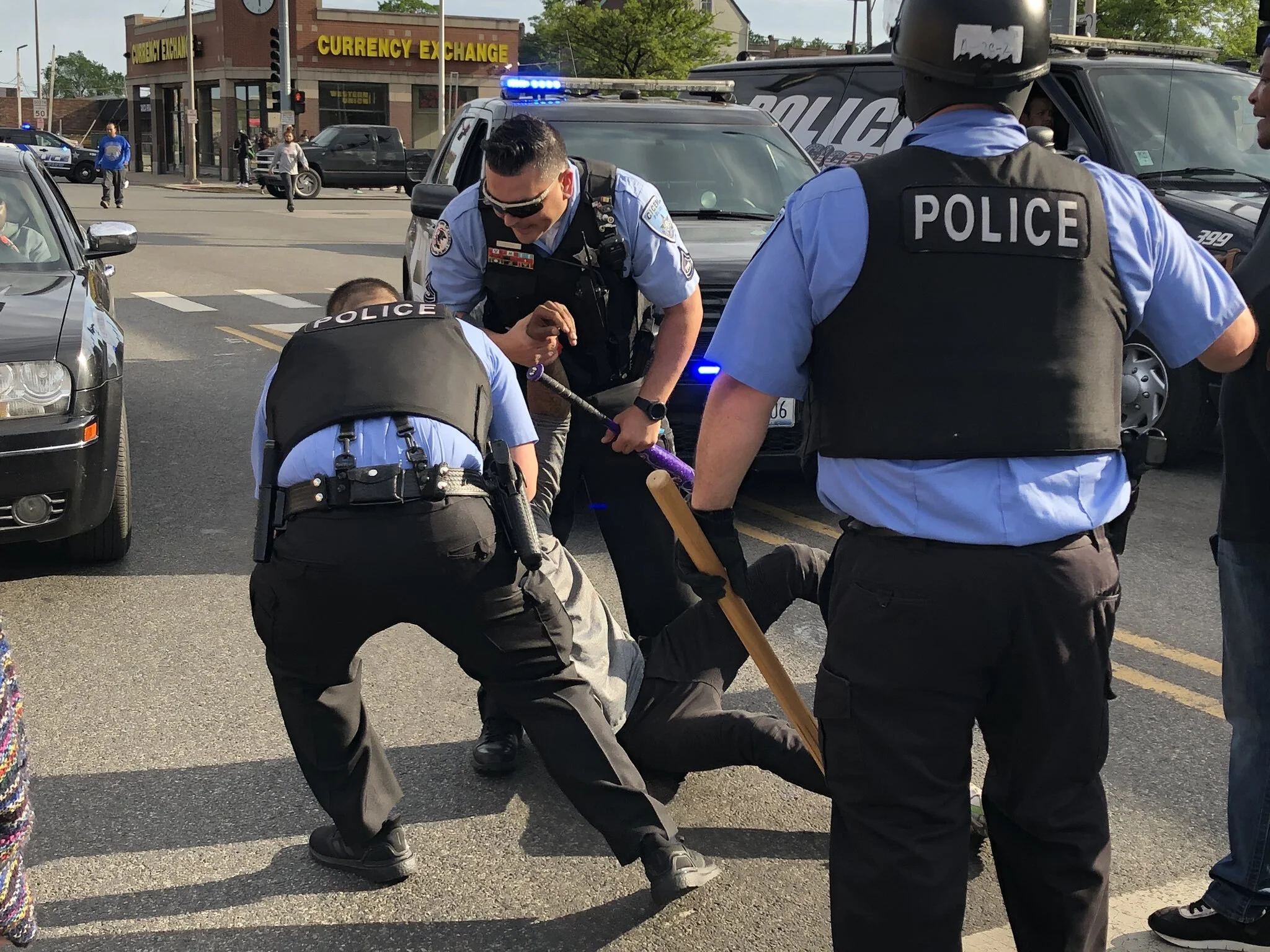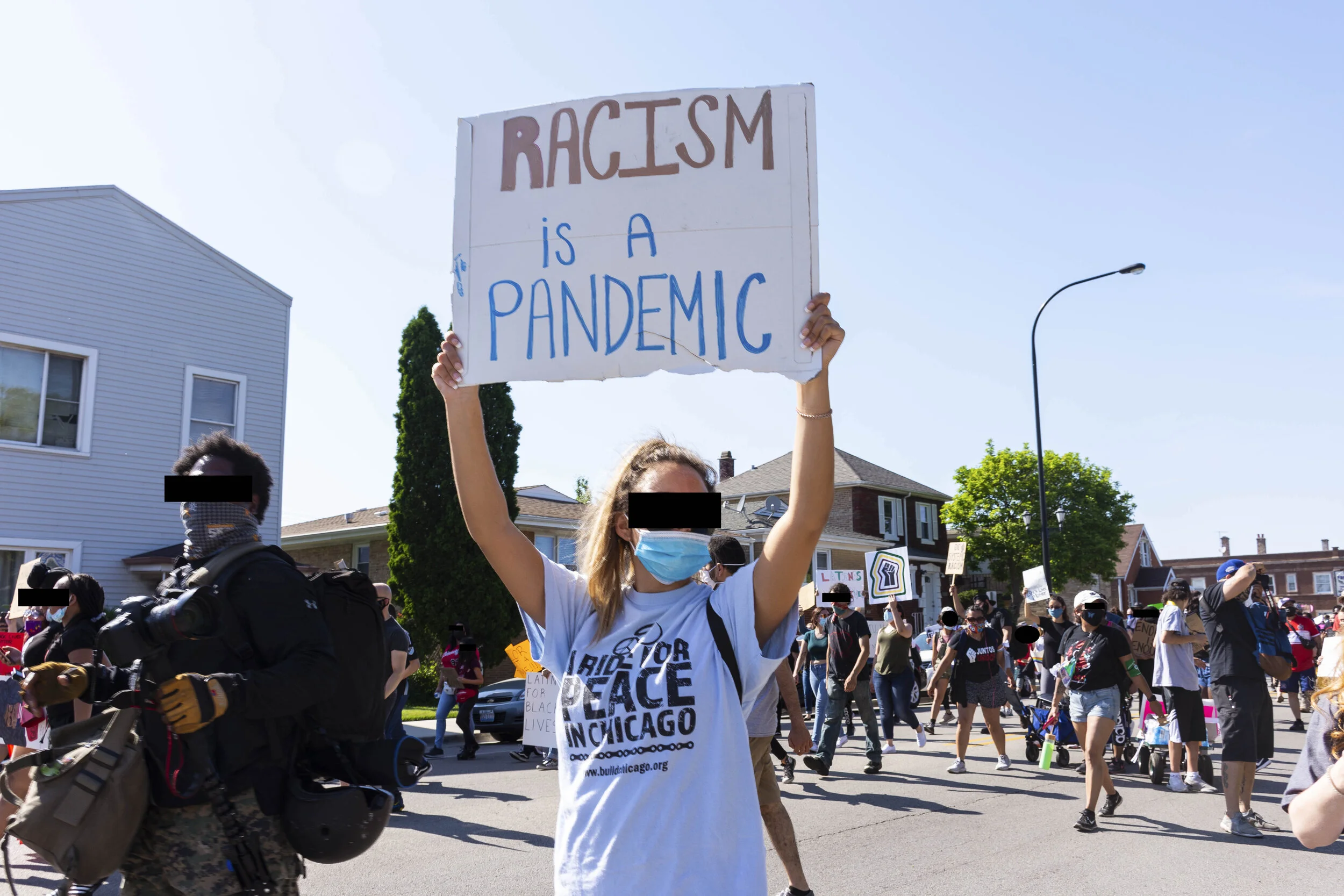Discussing Black Lives Matter with Older Latinx Generations
Illustration by Alyha Khalil, A Palestinian-Panamania, American student at Senn High School
By Luis Velazquez
Editorial Note: We use the phrase "non-Black Latinx" to refer to members of the Latinx community who do not identify as Black or people of African descent. There are Latinx people who are Black (Afro-Latinx) and Latinx people who are not Black. To us, this distinction is important given that our experiences living in the U.S. vary a lot by how we are racialized given that anti-Black racism is rooted in the history of this country.
“The movement has been the center of our conversation since it kicked off and I hope we continue to have those conversations,” said Jeremiah Jaimes who, along with his family in Berwyn, has been following Black Lives Matter (BLM) protests closely. “Ever since the movement happened, I've just seen a bigger push and interest in my parents... as they start seeing more videos of the protests, more stories, more narratives.”
While many non-Black Latinx youth support the BLM movement, many of them say their parents and older Latinx generations often struggle to understand the protests.
Jaimes, 22, says it was a long road for him to educate his parents about injustice.
The BLM movement was founded by three Black women in 2013 after the acquittal of Trayvon Martin’s murderer in Florida. According to the website, Black Lives Matter “builds local power to intervene in violence inflicted on Black communities by the state and vigilantes."
On May 25, George Floyd, a 46-year-old Black man was killed by a Minneapolis police officer and sparked mass protests across the country.
Like other non-Black Latinx youth, Cicero resident Estela Santillan, 19, says her mother’s views on BLM align with her own, but only to an extent.
“My mom agrees with BLM, but I think the thing that makes me and my mom disagree is that she doesn’t think violence, or rioting, is the right answer because I guess since she is an older woman she thinks peace is the right thing and violence is always a wrong thing,” Santillan said. “She fails to recognize that there are only [certain] ways to advocate for themselves [Black people] with the amounts of oppression that have gone against them.”
Jaimes says his grandparents hold resentment towards the Black community due to a previous incident that involved his grandfather almost passing away. Yet, he reminds his family of the negativity of generalizing stereotypes towards the Black community.
“Instead of resenting those who were responsible for what happened to him, they just targeted the whole Black community,” Jaimes said. “In a way, it breaks my heart because I had to kind of help and understand where they come from because I understand my grandpa almost passed away...at the same time, I kind of try and educate them on how it doesn’t mean to generalize the whole community.”
A family stand outside their home on June 7th, 2020 during the “Solidarity with Black Lives Matter Cicero Berwyn Walk” which was a direct response to the social unrest that unfolded on June 1 in Cicero. (Photo by April Alonso)
Yoselin Castillo, 21, also lives in Cicero and says her parents have been able to understand the BLM movement. She says her parents don’t partake in saying racist remarks but that is not the case with her grandparents.
Castillo recalls moments from her childhood where she would correct her family if they said something inappropriate. Her grandmother would tell relatives to be careful about what they said in front of Castillo or else Castillo would get mad. She believes it is important to make people realize certain ways of thinking are dangerous to Black lives.
“Ever since I was little I would call it out, but I didn't actually sit down to talk to them like an adult until I actually turned into an adult,” said Castillo. “You actually learn how to empathize with who you grew up with and actually have an effective conversation with them.”
Another Cicero young person, Anahi Velazquez, 21, says her family supports the BLM movement but, while her dad understands the reasons for the movement, he questions why the non-Black Latinx community is not receiving the same attention. This prevalent misconception fails to address the ways in which BLM and immigrants rights groups, who often center non-Black immigrants, have worked together to address interrelated systems of oppression.
“I put him on check because obviously it's not about us right now. Even when it is about us, and I told him, ‘I feel like the mentality that you carry about staying out of trouble and staying away. That mentality is what leads to no change,’” Velazquez said.
Concepcion Venegas, 52, a Cicero mother, says she supports the BLM movement. Venegas thinks that older Latinx people may have a harder time understanding new beliefs. She believes that sometimes Latinx adults would rather separate from new ideals and refuse to see change.
“Sometimes we don’t support anyone else. We only support our race, but sometimes we don’t even do that. So, I see more support coming from young people than us adults,” Venegas said.
Jaimes says he believes the older Latinx generation have a complicated mindset which is one of many factors as to why there is a huge difference in mindsets about the BLM movement with Latinx youth.
“A lot of the older generation, at least in Cicero, are immigrants. So they come to the United States in search of a better life. In that search, they think that the best way to protect themselves and their children is to take a seat and stay quiet and not demand for anything and just be grateful for what they have,” Jaimes said.
Some of this perceived complacency may stem from fear of coming in contact with Immigration and Customs Enforcement (ICE). In the past, ICE has targeted immigrant rights organizers and placed them in deportation proceedings and has arrested people at recent BLM rallies.
Many Cicero youth also brought up the existing anti-Blackness in the Latinx community.
“The closer you are to white, the closer you are to success. That's the perception that we have and that shows the anti-Blackness perception that we have in our Latinx community,” Jaimes said. “So I think we need to address that in our community and our homes and once we recognize that we could start moving forward and calling out injustices for Black and Brown lives.”
“I feel like a lot of people are talking to their families now and having these important conversations with them,” Castillo said.
“I see a lot and I know a lot of people are getting educated and my biggest hope is they come back and put that knowledge into action and help educate. I think it's essential to-- as you uplift yourself, go back and help uplift your community,” said Jaimes.
Resources created by other organizations and groups available for readers to discuss BLM and anti-Blackness:
Luis Velazquez is a Reporting Fellow for Cicero Independiente. He is currently a student at the University of Illinois at Urbana-Champaign.











